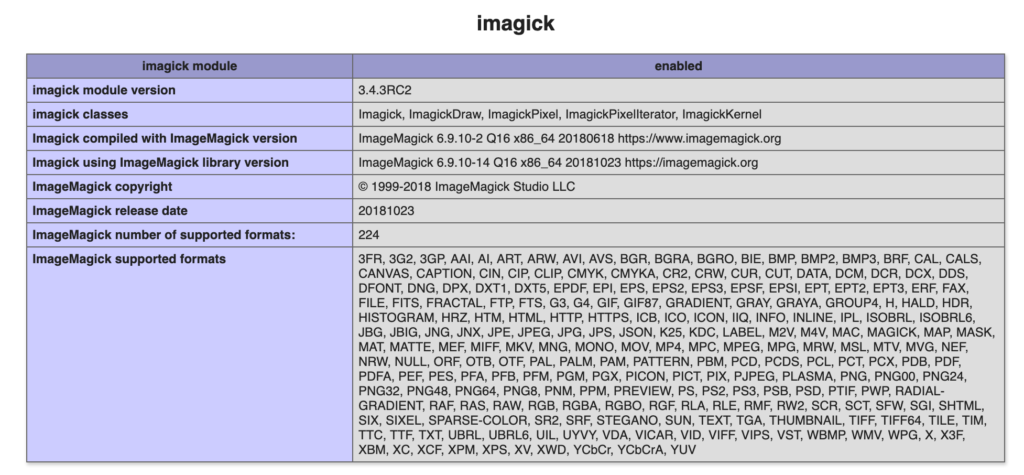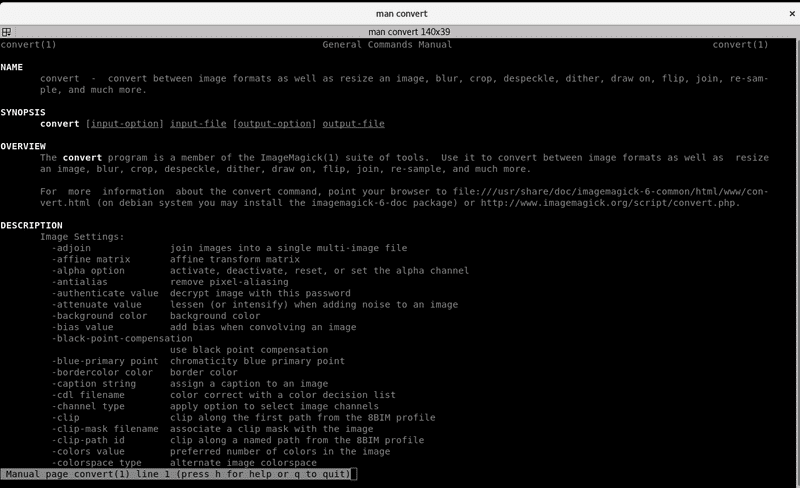

- #Imagemagick php 7.4 how to
- #Imagemagick php 7.4 install
- #Imagemagick php 7.4 Patch
- #Imagemagick php 7.4 verification
- #Imagemagick php 7.4 software
I gave apt install php-apcu as well as apt install php-imagick a try but both was not working for me. Reading through Google results says that you also can do Code: Select all sudo apt install php7.4-apcu but this results in package not found errors. Imagick classes => Imagick, ImagickDraw, ImagickPixel, ImagickPixelIterator, ImagickKernelĪlternatively, by adding the phpinfo() function to a php script, and then accessing the script from a web browser, we are able to see the module is installed and enabled. sudo apt install php-imagick with the same behavior. Which will output the following information, where the modules status is shown as enabled.
#Imagemagick php 7.4 verification
imagickįor a much more detailed verification of whether the PHP module was installed correctly, use the phpinfo() method.įrom the command line, run the following command php -r 'phpinfo() ' | grep imagick If the installation was successful, the output of the command will simply show one line, and it will only contain the name of the module imagick. Run the following command to verify the installation. To verify the installation was successful and that the module is enabled properly, we can use php -m from the command line, and grep the results to limit the output to only the line that is important. sudo systemctl restart apache2 Verify Installation In order for any new PHP extension to be used with your web application Apache must be restarted. Installing the module alone isn’t enough. php-imagick/bionic,now 3.4.3~rc2-2ubuntu4 amd64 Restart Apache Web Server The output will look similar to the following, and at the time of this writing, there was only a single version available. The -a flag tells apt to list all version of a package available from the repositories.
#Imagemagick php 7.4 Patch
This would be useful in the event that the latest patch introduces regressions, which is fairly uncommon. If you require a previous version of php-imagick, you can list the version available from the Ubuntu repositories using the apt list command. Like ImageMagick, to do an imagick php install we can simply run the apt install command. Version 3.4.3 of the Imagick PHP extension is available from the Ubuntu’s repositories. sudo apt install imagemagick:6.9.7.4 Installing Imagick PHP Extension For example, to install version 6.9.7.4 you would run the following command. sudo apt list imagemagick -aĪnd to install a specific version of a package we specify it with the apt install command. To list all available version from the Ubuntu repositories, use the apt list command with the -a flag. The following command will install the latest version available in the Ubuntu source repositories. ImageMagick version 6.9.2 is available from the default Ubuntu repositories, and it can simply be installed by running the apt install command.

#Imagemagick php 7.4 how to
This tutorial will show you how to do so on Ubuntu 18.04. To use the ImageMagick library with PHP applications, such as WordPress, we must first install the library and then it’s corresponding PHP class. Web applications often use the library for its high performance with operations against uploaded images, such as resizing and format conversions, for example.

It is distributed under a derived Apache 2.0 license.
#Imagemagick php 7.4 software
ImageMagick is free software delivered as a ready-to-run binary distribution or as source code that you may use, copy, modify, and distribute in both open and proprietary applications. Get Free $10 dollars for ServerPilot Click Here Get Free $100 dollars for Digital Ocean Click Here They also have a one click WordPress install.

You get Cloud hosting from Digitalocean at a good price and ServerPilot.io lets you setup the server add domains and free SSl. Please make sure you are running PHP 8 on your app in Serverpilot.io or C-panel, if PHP is set to 7.4 it will still give you the same error.įor best hosting Try DigitalOcean and Serverpilot.io user.ini or php.ini file, depending on your server, in the home directory of your WordPress install Then you’ll need to restart php-fpm for PHP 8 for the change to take effect:Īfter that’s done, you can confirm that it’s installed by running the following command: Sudo bash -c “echo extension=imagick.so > /etc/php8.0-sp/conf.d/imagick. If you are running PHP 8 on a Ubuntu server and get a WordPress Health Check error that ImageMagick is not installed, then you can try these commands to fix your issue.


 0 kommentar(er)
0 kommentar(er)
